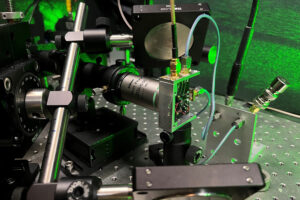
Quantum sensor at MIT. Photo by Guoqing Wang, MIT
By James Myers
Advancements in quantum sensing technologies promise revolutionary new applications for cancer treatment and personalized medicine, as well as navigation, communication, seismology, and a host of other applications that require precise measurements not possible with traditional methods.
Quantum sensing uses the properties of quantum mechanics in combination with light and other atomic properties to provide high-resolution measurements of variations in the properties of an object, such as its electrical or magnetic fields.
A form of quantum sensing has been in use since Magnetic Resonance Imaging (MRI) was introduced in the early 1970s. MRI is a harmless and non-invasive procedure that provides doctors with three-dimensional images of a patient’s organs such as the brain. MRIs operate with a powerful magnetic field that causes hydrogen nuclei in the target area to align in a way that their changes can be measured.
New discoveries are increasing the accuracy and sensitivity of quantum sensors. In July, the University of Calgary announced that a research team led by Dr. Shabir Barzanjeh imaged intricate microscopic patterns in micrometre-sized layers of material. To achieve this, they used the phenomenon of quantum entanglement – which occurs when one quantum combines with another so that what happens to one instantly happens to the other, with no time delay – and algorithms based on genetic selection mechanisms. The team used a novel method to reduce interference in the images.
A year earlier, scientists at MIT announced the development of a quantum sensor capable of detecting any arbitrary frequency without degrading measurements. It was a major advancement in quantum sensors that were previously capable of detecting only a few specific frequencies.
Quantum sensing holds the potential for early detection of cancerous cells, when current methods sometimes fail to locate tumours before they grow to a size that could threaten a patient’s life. A research team at the Max Delbrück Center in Berlin, led by Hendrik Bartolomaeus, is working on a method of early cancer detection using mid-infrared light radiation. The research team hopes that this new kind of quantum sensor technology “will make the technique suitable for everyday use in hospitals” to deliver rapid analysis of cancerous cells.
In testing planned for the next five years, the research team’s techniques might also prove useful for early detection of cardiovascular, kidney, and other diseases.
Reports indicate the U.S. Department of Defense is taking an interest in quantum sensing for precision navigation and geographic data. Concerned that current global positioning systems (GPS) could be subject to enemy interference, the military is considering quantum sensing as a replacement for GPS when the technology advances further.

Atoms in a glass vapour cell are excited with laser beams to Rydberg states. They detect the electric fields from the gold antenna and imprint the information onto the laser beams. Image: U.S. Army
Still in its early days, quantum sensing offers promise for a myriad of applications that require precise measurements that are beyond the reach of existing technology.
What will a quantum sensing-enabled future look like? The implications for human health, scientific discovery, financial returns, and national security could be revolutionary. Have we begun to consider the full potential of this evolving technology?



